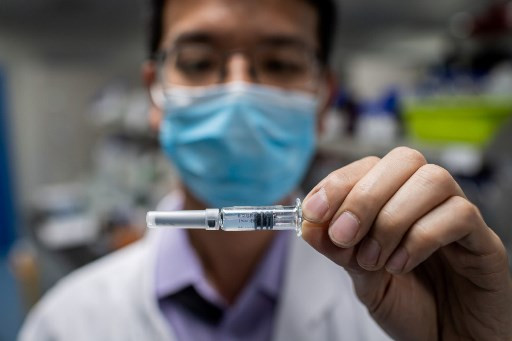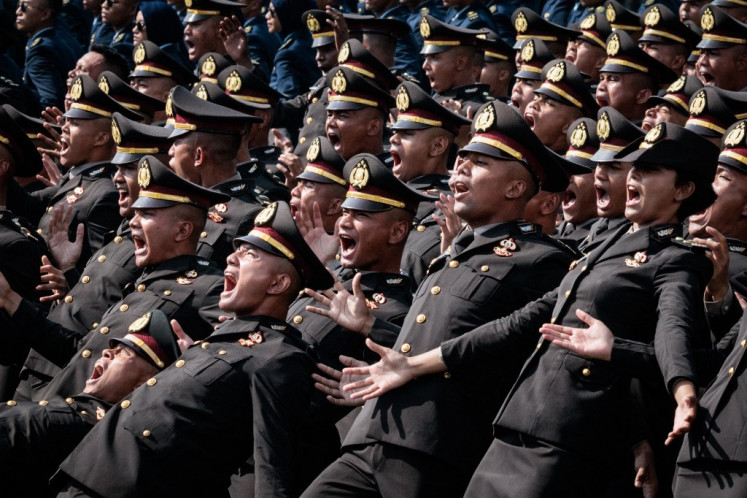Popular Reads
Top Results
Can't find what you're looking for?
View all search resultsPopular Reads
Top Results
Can't find what you're looking for?
View all search resultsPhase III trials of COVID-19 vaccine start on Tuesday
The trials are expected to finish in half a year at the earliest.
Change text size
Gift Premium Articles
to Anyone
I
ndonesian scientists are set to start the phase III clinical trials of a potential COVID-19 vaccine developed by China-based biopharmaceutical company Sinovac Biotech on Tuesday in six different locations in the West Java provincial capital of Bandung.
Padjadjaran University (Unpad) School of Medicine professor Kusnandi Rusmil, who is also the clinical trial research team leader, said the human trials would commence on Aug. 11 although the number of registered volunteers as of Thursday was still half the target.
“So far, about 800 volunteers have registered [for the trials],” Kusnandi said on Thursday.
The tester team was looking for a total of 1,620 volunteers, he said, and that volunteer registrations would be open until Aug. 31.
The six locations chosen for the trials are the Unpad School of Medicine Education Hospital, an Unpad campus, as well as four community health centers (Puskesmas) in Bandung, namely Sukapakir, Garuda, Ciumbuleuit and Dago.
The trials are expected to finish in half a year at the earliest.
Kusnandi said half of the 1,620 volunteers would be injected with the potential vaccine, while the other half would get a placebo. The trial subjects will be divided into the two groups randomly.
Prior to the trials, the team will make sure that volunteers receive a clear explanation about the trial process from doctors, before they sign a letter of consent to be test subjects.
Kusnandi said the volunteers must be physically healthy and must test negative for COVID-19 prior to the vaccine trials. Eligible volunteers would proceed to the first injection, he said.
After the first injection, he added, the volunteers would be observed for 30 to 40 minutes to find out if they showed any reaction to the vaccine. Volunteers who showed no reaction could safely go home, he said.
“Fourteen days after the first injection, they will be given the second injection. After that, we will follow [their health condition] over the course of six months,” said Kusnandi.
“We will compare the results between the two groups of volunteers — their health and their immunogenicity.”
State-owned pharmaceutical holding company Bio Farma president director Honesti Basyir said the company was currently conducting a stability test on the vaccine in its laboratory facilities.
“It will take three to four weeks,” said Honesti, adding that the genome of the virus in Indonesia was 99.99 percent similar to that in China.
He said Bio Farma would increase its production capacity and be ready to produce 250 million doses of the Sinovac vaccine per year by December.
The company also planned to invest loan funds of at least Rp 1.3 trillion (US$88 million) in the development of infrastructure and human resources in the research and production units, he added.
Food and Drug Monitoring Agency (BPOM) head Penny Kusumastuti Lukito said the agency had been working closely with the clinical trial research team to make sure the phase III trials could be carried out safely and in an ethically appropriate manner.
“The BPOM has assisted the formulation of protocols and methodologies, and we have an ethics committee to ensure the implementation of clinical trials is ethical and those involved are protected,” said Penny.
Meanwhile, local religious figures should play a larger role in educating people about COVID-19 health protocols, an official from Muhammadiyah, the country’s second-largest Islamic organization, has said.
Muhammadiyah COVID-19 Command Center vice secretary Deni Wahyudi Kurniawan said local public figures should set an example by adhering to health protocols strictly, such as consistently wearing a face mask in public places.
“If Islamic scholars, clerics and members of the Mosque Prosperity Council [DKM] urge the public to wear a face mask, I believe many will follow their example,” Dani said during a discussion on Friday.
The Islamic organization has issued a regulation requiring officials working at its educational institutions to wear a mask. Public figures have also been urged to educate people about the importance of wearing a mask.
According to a Muhammadiyah survey, public awareness about the importance of wearing a mask in public places is still low, except in houses of worship and office buildings.
Separately, Muhammad Makky Zamzami of Nahdlatul Ulama (NU), the country’s largest Islamic organization, said public figures who did not take the pandemic seriously were hindering campaigns to encourage mask-wearing.
He added that NU had been actively campaigning to convey the importance of strict health protocols and of wearing a mask in public places. (syk)










